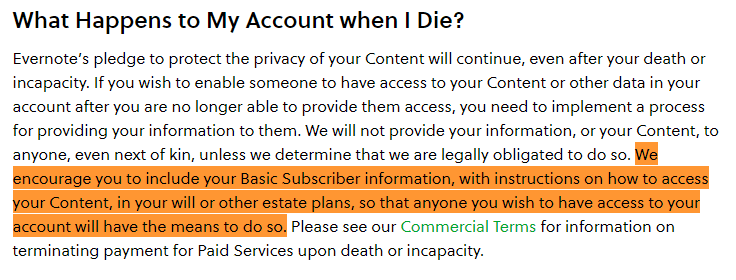Because it's Halloween, here's something to ponder...
How many online accounts do you have? Social media, banking, forums, apps, bills, blogs, code repositories, games. How much of your intellectual property, content, identity, and life in general live online?
What would happen if you were to die tomorrow?
Would anyone other than you be able to access all that you have online if you suddenly vanished? If you have friends solely on the Internet, how would they find out if you were no longer living?
Estate Planning
Your online presence and property are often overlooked during Estate Planning. We have common documents like Wills, Trusts, and Power of Attorney but no boilerplate to handle our online lives.
Why is this the case? In many ways, the Estate Planning industry is decades behind. With so much of people's lives now centered around the Internet, there is much room for improvement in this industry suffice to say.
What company policies exist to handle this?
There are a number of policies depending on the type of service you use. For social media, your loved ones' primary option is to memorialize your profile. Here are Facebook's guidelines tucked away in their Help documentation.
If, however, you use a service that may contain valuable information or intellectual property such as a note taking service or code repository, it gets a bit trickier Let's have a look at Evernote's Terms:
Basically, their policy is "store your credentials near your Will and give your account information to your friends." Ok, I guess that's fine.
What about our email accounts?
Google has a process to either close or obtain information from a deceased loved one's account outlined here. They recommend setting an Inactive Account Manager to let them know who can access your account when you have been inactive for a long time.
Steps you can take today
Each service has its own policy and process for handling deceased users. Unfortunately, this is not something we often think about. Setting an Inactive Account Manager is not something a user thinks to do immediately after creating an account.
If you have loved ones, children, or a business that depends on valuable intellectual property, you need to make sure that you have a means for your loved ones and/or business partners to gain access to your online content and properties.
So what can you do? Since every service is different, you can simply create a spreadsheet with all of your important accounts that describes use, purpose, and includes access credentials. If your account requires two-factor authentication, specify the method used (text, auth app, e-mail, phone). Print it out and keep it near your Will or Trust. Just make sure to safeguard your spreadsheet document! This is the easiest.
If you are concerned about storing credentials in a document, another method is to read the Terms of Service and deceased user policies of each service you use and create a document with references to each one. At least your loved ones will know the services and products that you currently use. They can then follow the service's procedures as outlined.
If you have a business/startup
Make sure you have at the very least a policy and process to handle deceased users, especially if you run a service that hosts their sensitive or valuable information.
Consult a qualified attorney to help you draft your process, which will then guide the design and workflow of any technologies you must create to fulfill your duties.
Conclusion
I hope that this gets you to start thinking about your life and content online. This topic is something we rarely think about, but as our lives continue to migrate more and more online and into the virtual world, it is absolutely crucial that you take some sort of action to protect yourself, your loved ones, and/or your business.
I wish you a Happy Halloween!
Follow me on Twitter @eddieaich




Top comments (1)
Some people believe, that if it's been very good data, it gets uploaded to a shared space where it can reunite with other data and executable code it was linked with in the past, specifically at the revision it found most compatible.